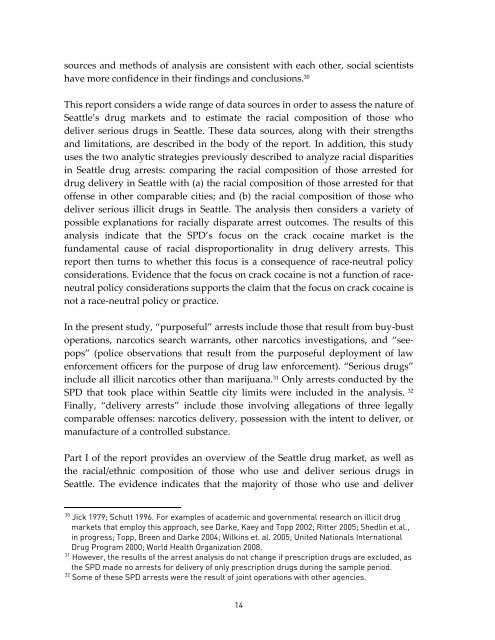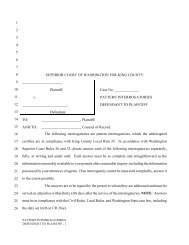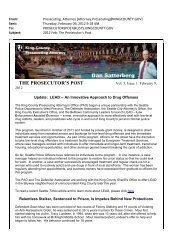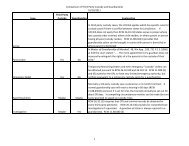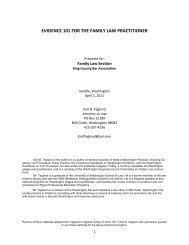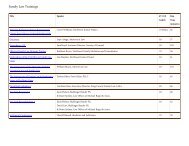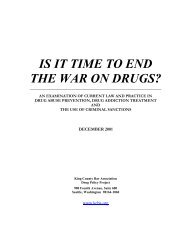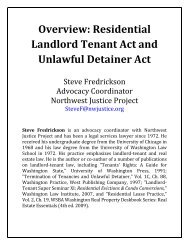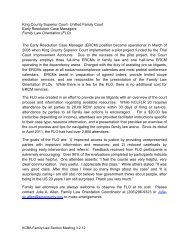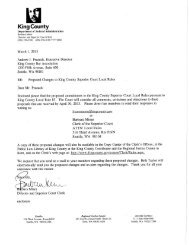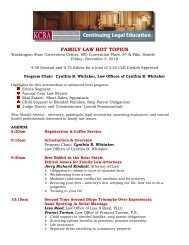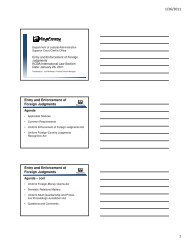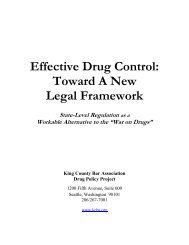RACE AND THE ENFORCEMENT OF DRUG DELIVERY LAWS IN ...
RACE AND THE ENFORCEMENT OF DRUG DELIVERY LAWS IN ...
RACE AND THE ENFORCEMENT OF DRUG DELIVERY LAWS IN ...
You also want an ePaper? Increase the reach of your titles
YUMPU automatically turns print PDFs into web optimized ePapers that Google loves.
sources and methods of analysis are consistent with each other, social scientists<br />
have more confidence in their findings and conclusions. 30<br />
This report considers a wide range of data sources in order to assess the nature of<br />
Seattle’s drug markets and to estimate the racial composition of those who<br />
deliver serious drugs in Seattle. These data sources, along with their strengths<br />
and limitations, are described in the body of the report. In addition, this study<br />
uses the two analytic strategies previously described to analyze racial disparities<br />
in Seattle drug arrests: comparing the racial composition of those arrested for<br />
drug delivery in Seattle with (a) the racial composition of those arrested for that<br />
offense in other comparable cities; and (b) the racial composition of those who<br />
deliver serious illicit drugs in Seattle. The analysis then considers a variety of<br />
possible explanations for racially disparate arrest outcomes. The results of this<br />
analysis indicate that the SPD’s focus on the crack cocaine market is the<br />
fundamental cause of racial disproportionality in drug delivery arrests. This<br />
report then turns to whether this focus is a consequence of race-neutral policy<br />
considerations. Evidence that the focus on crack cocaine is not a function of raceneutral<br />
policy considerations supports the claim that the focus on crack cocaine is<br />
not a race-neutral policy or practice.<br />
In the present study, “purposeful” arrests include those that result from buy-bust<br />
operations, narcotics search warrants, other narcotics investigations, and “seepops”<br />
(police observations that result from the purposeful deployment of law<br />
enforcement officers for the purpose of drug law enforcement). “Serious drugs”<br />
include all illicit narcotics other than marijuana. 31 Only arrests conducted by the<br />
SPD that took place within Seattle city limits were included in the analysis. 32<br />
Finally, “delivery arrests” include those involving allegations of three legally<br />
comparable offenses: narcotics delivery, possession with the intent to deliver, or<br />
manufacture of a controlled substance.<br />
Part I of the report provides an overview of the Seattle drug market, as well as<br />
the racial/ethnic composition of those who use and deliver serious drugs in<br />
Seattle. The evidence indicates that the majority of those who use and deliver<br />
30 Jick 1979; Schutt 1996. For examples of academic and governmental research on illicit drug<br />
markets that employ this approach, see Darke, Kaey and Topp 2002; Ritter 2005; Shedlin et.al.,<br />
in progress; Topp, Breen and Darke 2004; Wilkins et. al. 2005; United Nationals International<br />
Drug Program 2000; World Health Organization 2008.<br />
31<br />
However, the results of the arrest analysis do not change if prescription drugs are excluded, as<br />
the SPD made no arrests for delivery of only prescription drugs during the sample period.<br />
32<br />
Some of these SPD arrests were the result of joint operations with other agencies.<br />
14


